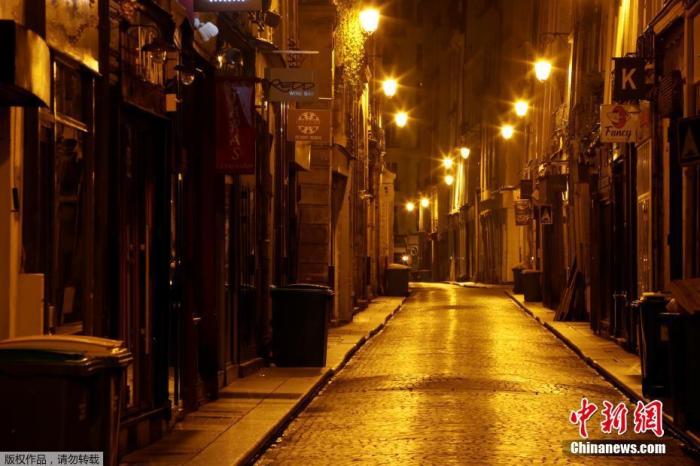(Fighting against New Coronary Pneumonia) Global War Epidemic: France Enters the Second National "City Lockdown": The Economy is Bearing the Impact Again
China News Service, Paris, October 30th, title: France enters the second national "closed city": the economy bears the impact again
China News Agency reporter Li Yang
In response to the worsening second wave of the new crown pneumonia epidemic, France officially entered the second nationwide "city closure" on October 30, local time, for a month.
Non-essential travel of the people is prohibited, and non-essential public places are closed.
The French economy had to be hit by the "closure of the city" again.
On October 30, local time, France formally implemented the second round of nationwide "city closures" for one month in response to the sharp rebound of the new crown pneumonia epidemic.
A reporter from China News Agency saw in the center of Paris that day that France’s second nationwide "closure" was basically the same as the first time this spring.
Most non-essential public places such as restaurants, bars, and shopping malls have been closed. Only a handful of shops, such as supermarkets, pharmacies and small food stores, are still open.
The reporter noticed that many supermarkets in Paris have sufficient stocks of food and daily necessities. Except for individual products such as pasta, which need to be restocked due to active purchases, most of the products are neatly placed on the shelves for selection.
With the first experience of "closing the city", people are more calm and rational about "closing the city."
The prosperous districts in the center of Paris, such as the Champs Elysées and Rivoli, which had just picked up to attract customers, returned to silence that day, with almost no pedestrians visible.
Museums such as the Louvre are also closed again.
The catering and cultural and entertainment industries were once again severely impacted by the second "closed city".
Previously, restaurants and bars could continue to operate during non-curfew periods, and they could only be closed after the implementation of the "closed city".
The operation of cultural venues such as movie theaters, theaters and concert halls has been subject to various restrictions before, and the "closure of the city" has also made these venues face greater difficulties.
Whether French bookstores can continue to operate during the "closure of the city" has become one of the focus issues.
Those who support the continued operation of the bookstore include Paris Mayor Hidalgo.
French officials basically determined that the bookstore would not be open during the "closed city" that night, and also considered that the bookstore area of the supermarket was temporarily closed.
This is obviously worried that if bookstores are allowed to make an exception, other industries will follow suit.
France will face huge economic costs in implementing the second national "closed city".
French Minister of Economy and Finance Le Maire revealed that the cost of a one-month “closure of the city” in France may reach 15 billion euros, which means that the finances are facing tremendous pressure.
The French new crown pneumonia epidemic has reached a critical juncture.
According to the official epidemic data released on the evening of the 30th, on the 30th, the number of new confirmed cases in France in a single day once again approached 50,000, reaching 49,215; the cumulative number of confirmed cases has reached 1.33 million.
At the same time, the virus test positive rate has reached as high as 20%.
As the relevant figures show that the epidemic is far from being contained, it is necessary for France to implement the second nationwide "city closure".
Le Maire said that the second nationwide "closed city" will significantly slow down the recovery momentum of the French economy.
He predicts that the French economic recession will be more severe than expected earlier this year. Due to the second "closed city", France's economy will decline again in the fourth quarter of this year and face "difficulties."
According to the latest poll released on the 30th, most people in France still support the implementation of the second "closed city", but the support rate is significantly lower than that of the first "closed city".
67% of the respondents supported the second "closed city", while the support rate for the first "closed city" reached 93%.
Most interviewees believe that the duration of the second "closed city" may be extended.
Polls show that 84% of respondents are worried about the epidemic situation.
The poll also shows that 49% of the respondents support the closure of non-essential public places, 93% of the respondents support telecommuting, and 92% of the respondents support the state's funding of small and medium-sized enterprises affected by the "cities closure".
Le Maire confirmed that the French government’s support for enterprises will be stronger than during the first “closed city”. The state will provide subsidies to small and medium-sized enterprises that are forced to close due to the impact of the “closed city” to help relevant enterprises tide over the difficulties. .
French public opinion generally predicts that choosing to implement the "closed city" at this time is also aimed at saving the traditional consumption season on Christmas Eve.
If the epidemic can be brought under control in early December, and the number of new confirmed cases in a single day has dropped significantly, the government may announce deregulation measures and re-impose a curfew on the occasion of the Christmas consumption season to replace the current "city closure."
However, the direction of the epidemic is currently unclear, and it is difficult to make a premature judgment. Therefore, the economic outlook is still full of uncertainty.
(Finish)

